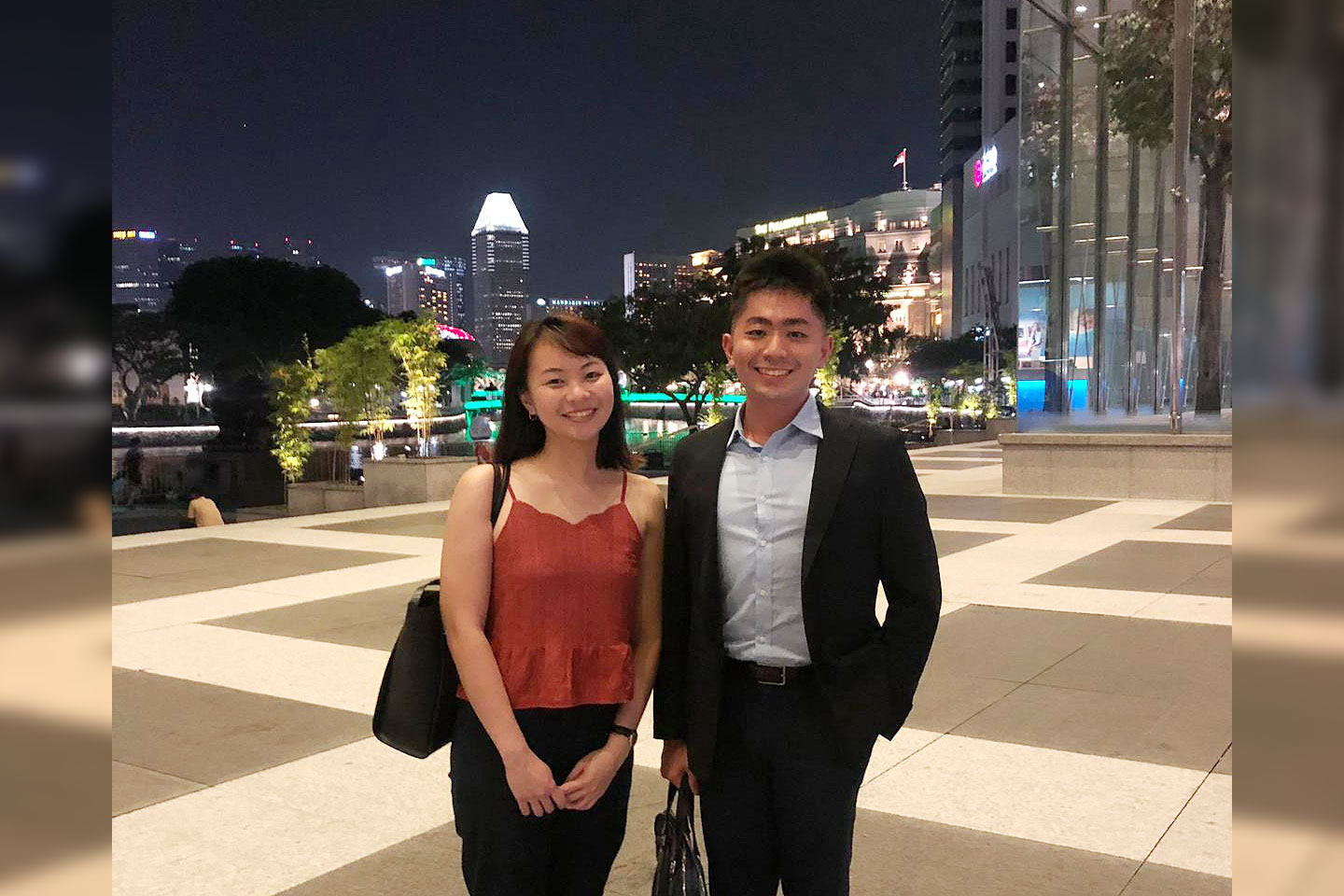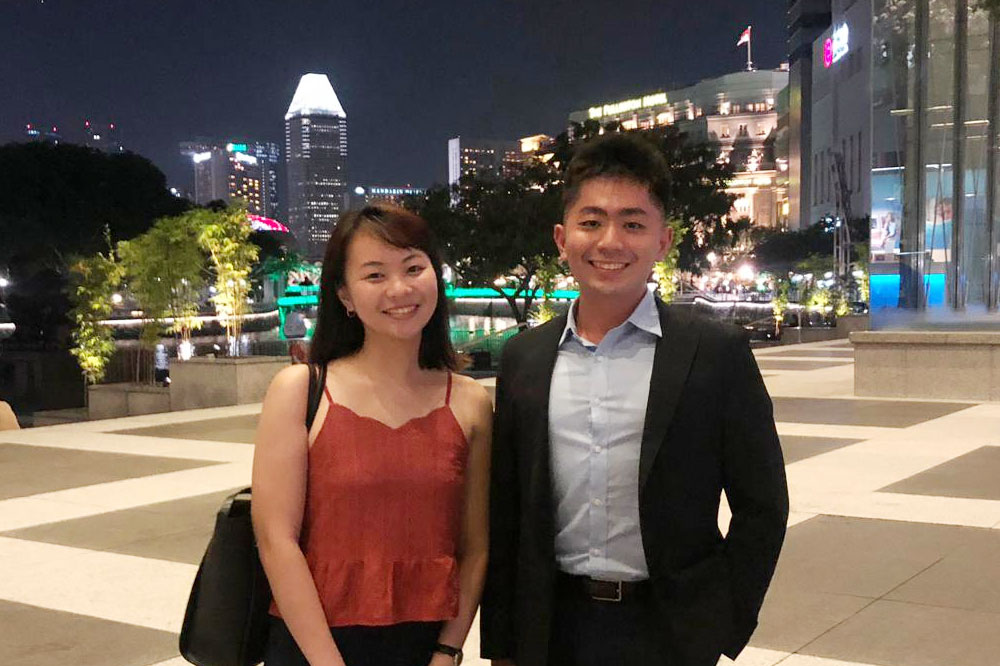Fred started his career as an auditor at Ernst & Young LLP (EY), in which he secured a preliminary offer in Year 2 as an undergraduate in NUS. Now, he works at S&P Global. In his free time, he plays the guitar and piano. He also enjoys playing sports like tennis, golf and kayaking. He is an avid reader and enjoys reading biographies for the valuable life lessons that can be learnt.

Alumni Spotlight Stories: Fred Wang

Q: How have your experiences in university helped you in understanding yourself?
After I completed my National Service (NS), I looked forward to university. Before I officially started my stint as an undergraduate in NUS Business School, I took part in several camps for the freshman, these included the NUS Students’ Community Service Club (CSC) camp, NUS Students’ Union camp and the NUS Business Orientation week camp. Afterwards, I continued to be a regular volunteer with CSC and took on leadership and management committee positions.
Essentially, I agree that studying in a university is challenging, there is a need to constantly motivate yourself and find some extra-curricular activities to relax. During the school semesters, I realised that taking up modules of various disciplines had helped me understand myself in terms of my strengths and weaknesses. For instance, for the modules that I know that I could excel in, I would double up the effort and work towards my goals. I realised that it is important to prioritise and know what you are good at.
Q: Can you share with us some of your considerations in selecting your first internship and your takeaways from subsequent internships?
I secured an accounting internship in the summer of my first year in NUS. Fun fact: the company was the first to offer me an internship opportunity after 23 interview rejections. In selecting my first internship, I was looking for an opportunity to apply what I have learnt in school.
Subsequently, I went on to pursue a data reporting internship at a Japanese firm. I was given the autonomy to lead a climate survey project, which was a fulfilling experience because the management had faith in my capabilities and gave me learning opportunities. I was very fortunate to be able to lead the project as an intern.
I think that as an undergraduate, it is a good opportunity to explore and gain all-round experience in different types and scale of companies, from the small and medium enterprises (SMEs) and start-ups to government sector companies and multinational corporations (MNCs). Gaining experience matters. I did an audit internship thereafter and it gave me the opportunity to network with the audit professionals and learn more about the audit industry. The internship allowed me to hone my interpersonal skills and improve my Excel skills.
After graduation, I went to pursue a finance internship in a SME for two months, tidying up process manuals and interviewing accountants on their work processes. Following which, I took up another internship in an education technology start-up in Ayer Rajah start-up hub to assist the team in expansion efforts to Southeast Asia. I secured a preliminary offer in my second year of undergraduate studies and started my career as an audit associate at EY after graduation. My stint as an audit associate has given me a clearer perspective of what I would like to pursue as a career. I have thus changed roles and am enjoying what I do now at S&P Global.
Q: What did you like about the audit profession?
The audit profession trains individuals to be disciplined. When you first start working after graduation, the first few years are bound to be tougher with the long hours and steep learning curve. In that sense, the long hours when working as an auditor prepares you and gives you a glimpse of how it is like to start working full-time upon graduation. Audit also trains you to be accountable. In an engagement, different procedures are delegated to different audit associates, and each associate is responsible for the related work. Lastly, the audit role allows me to meet a lot of new people. Most of the time, my batchmates are about the same age as me, so it feels nice to meet and speak with people who I can relate to. In my opinion, nothing will be too big of a challenge since you will be prepared and well-equipped for it.
To get closer to your goals, increase your network.
Q: What do you like about your current role?
I would say that the management is really supportive. They believe in my potential and they are willing to provide me opportunities to learn and grow. In addition, there are recognition for your efforts and I was fortunate enough to visit our HQ in London for training and presentations. There was one time when I was in London, and the Global Head made time to speak with me to find out how I was doing and the projects I was spearheading. Essentially, I like how the management empowers me and allows me to improve as an individual.
Q: What are some traits and qualities that you think a graduate should possess to be able to succeed in the working world?
First of all, I think that graduates should be patient to be able to work well with people in a team. Secondly, I think that being perseverant is an essential personality trait. I think that politics at the office is not avoidable all the time. In the event that you are exposed to office politics, you need to be clear-headed and keep your goals in mind. Last but not least, regardless of what field you are in, having a sense of humour will make you a fun individual to work with. When people like working with you, they will tell others about the positive impressions they have of you. That is how you make an impression.
Q: What are your thoughts on maintaining a work-life balance?
I think that there should be some work-life integration. I would usually leave the weekends for myself to socialise, play some sports and even watch some movies. I would also bring my grandma out for walks. I would say that I maintain a 70-30 ratio for work-life balance. Definition of work-life balance differs from person to person, but I am personally satisfied with my work-life balance right now. If the need arises, I don’t mind putting more hours into the work.
Generally, it will be good to strike a balance but there are some instances where you will need to work more, especially when you first start out as a fresh graduate – it is bound to be tougher in your first few years of work to build a firm foundation and know your expertise.
Q: Were there any instances where you have encountered difficult clients? How did you work around those difficulties?
Well, I have been pretty lucky that most of the clients that I have met are co-operative. I also happen to click well with the client management, which makes speaking to them much easier. However, in the event where you’ll meet difficult clients, my advice would be to be firm and tactful.
Academic results are important, but experience and work ethics will matter even more.
Q: With the rise in technology, are there any threats or opportunities that you would like to share about in the audit industry or professional services industry in general?
The rise of artificial intelligence (AI) will expedite a lot of paperwork and processes. I doubt that AI is in the power to replace people, because work in the audit and financial services industries requires personal interaction. Human touch is important. AI’s possibilities are anticipated but we still have pretty limited preparation to embrace the various possibilities AI brings. Ultimately, humans will still have the power to control what features it wants to include in AI. We can only expect the changes that AI will bring, but AI will not entirely replace humans as we are still needed to serve as a control check.
Q: In light of the looming recession, what advice do you have for our readers?
It could be more difficult to find a job, thus it is good to start sourcing early. In the event of a recession, it will affect all of us. However, if you are truly capable with strong foundations and work ethics, you will emerge victorious. In the event of retrenchment, my advice is not to give up and stay positive. Everything will work out in the end.
Q: Is there a particular quote or a book that you’ve read and you would like to share with our readers?
One book that I would like to share is “Chasing Water: Elegy of an Olympian” by American Olympian Anthony Ervin. I started swimming at 7 years old and have been swimming for almost 20 years, thus I follow the Olympic swimming events. Anthony Ervin was awarded the gold medal in the men’s 50-meter freestyle during the 2000 Summer Olympics. Unfortunately, he spiraled into a life of alcohol and drugs and lost himself. He was back in the game in 2012 but did not win any medals. In 2016, he was the oldest Olympian at 35 years old to clinch a gold medal in the men’s 50-metre freestyle event. The book highlights how Ervin made an Olympic comeback.
Q: Lastly, are there any pieces of advice that you wish to give to our readers?
One piece of advice is to apply early for internships. It will be a very competitive process but never give up. Take the time to understand the job descriptions for the roles you are applying for. Also, find a mentor that will accept you for who you are and give you learning opportunities.
To get closer to your goals, increase your network. Academic results are important, but experience and work ethics will matter even more. Take the time now to find out more about yourself – find out what you know and don’t, and explore roles to understand what you like and what you can do well in.
Lastly, I want to share a quote that I find meaningful. “Don’t let who you were talk you out of who you are becoming.”
The Alumni Spotlight Stories is a weekly series that explores a Bizad alumni’s journey from school to the working world. The story was first published in “Alumni Spotlight Stories: From Student Life to the Peak of your Career” compiled by the NUS Business School Alumni (NUSBSA).


